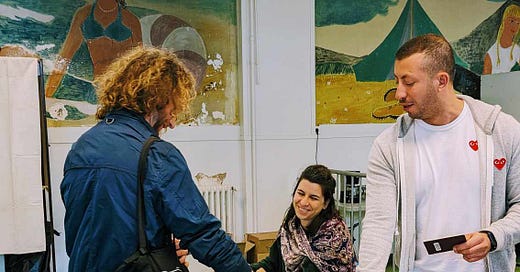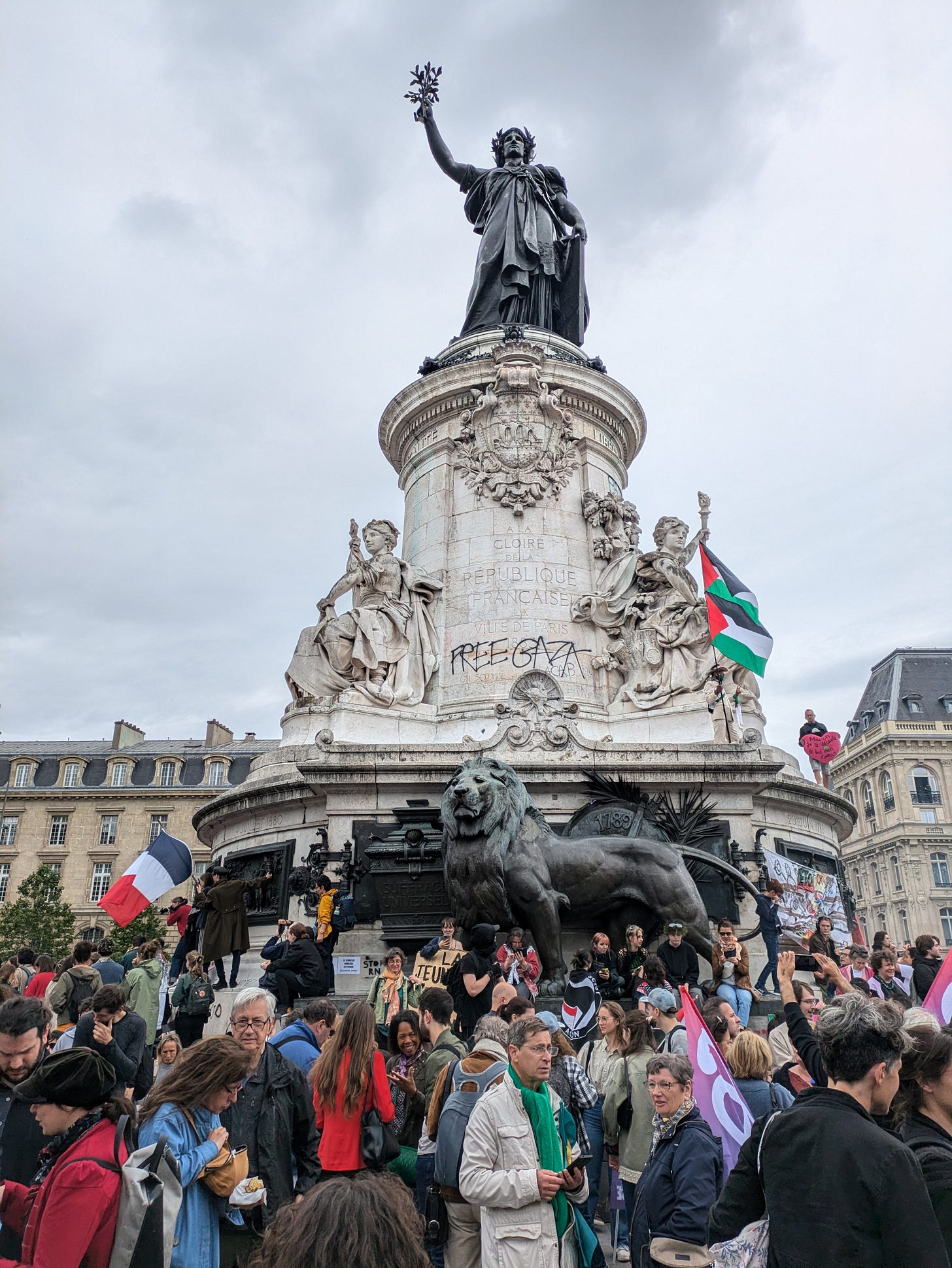On June 10, the day after I voted for the first time as a French citizen, it started raining and hasn’t stopped. Outside of my apartment in Montreuil, a traditionally working-class suburb just to the east of Paris, there’s a fine mist that feels like being trapped in a cloud. For the past week, blustery winds have swept across Paris and its suburbs, blowing recycling bins into bike lanes and pollen into our eyes. It’s as if the weather is responding to the existential dread we — progressives, foreigners, adoptees of the country known for its “invention” of human rights — have felt since the far-right, led by 28-year-old proto-fascist and Tik Tok heartthrob Jordan Bardella, swept across France, my adopted country, in the June 9 European Elections. We watched as the electoral map filled with brown sludge — the color aptly chosen to depict Marine Le Pen’s Rassemblement National (RN) party.
It’s a feeling I’m getting used to. The day I became French — December 19, 2023 — Emmanuel Macron’s party passed an immigration bill hailed and voted into law by members of Le Pen’s party who called it an “ideological victory.” That law made it harder for foreigners — and by this I mean everyone from study abroad students to economic migrants and asylum seekers — to access social services, restricted family reunification and accelerated the deportation of immigrants under the OQTF, or Obligation de Quitter le Térritoire Français regulation.
In my seven years living in France — one as a teacher, two as a graduate student and four as an investigative journalist — I’ve seen talking heads spewing xenophobic rhetoric on 24-hour news channels increasingly legitimized. I’ve watched as the town where I spent my childhood summers, in rural Champagne, has gone from centrist to far-right — with one in two voters supporting anti-immigrant Bardella in the recent elections. I’ve written about how the mainstream right has adopted the dog whistles of the far-right and spoken with migrants who have been displaced, ignored, and kicked to the curb to serve the interests of international tourists and foreign capital.
Accomplishing the twin goals of obtaining citizenship and voting for the first time took a weight off my back, as I wrote back in December on the site formerly known as Twitter. I knew and had experienced first-hand the legal and administrative hell that all immigrants to France must go through. Even as a white American who spoke French and had studied at a fancy university, it seemed, at times, impossible. After years of uncertainty, I felt that I had finally earned something that couldn’t be taken away from me.
Then came Jordan Bardella.
It didn’t have to be this way. June 9 started off a brilliantly sunny day around 20 degrees Celsius. It was my first time voting in France, and my (exceedingly French) partner and I excitedly sauntered over to our voting center, a middle school in Montreuil, in late morning where I slipped my bulletin into a glass case to the tune of “Phineas Rueckert: a voté.”
Then, we walked through Montreuil — a wonderful mix of nationalities, ethnicities and cultures — to the Robespierre metro, named after the left-wing revolutionary, and spent the rest of the day as young Parisians do, sipping beers by the Canal Saint-Martin, reading Libé and going to see a bad play. When — thirsty and confused — we exited the theater that evening, we found a changed (and broken) country.
In light of Bardella’s victory, Macron chose to dissolve the Parliament and called for snap elections — kicking off a crazy week in French politics and taking us all by surprise. The next day, Eric Ciotti, the head of the right-wing party Les Républicains (LR) made an alliance with the RN, locked himself in his office to keep other members from meeting to vote on his exclusion, took the party’s Twitter account hostage, became a meme, yelled at journalists from a window, and was ultimately allowed back into his party by a judicial decision. Further on the right, Marion Maréchal Le Pen, recently elected to the European Parliement under the Reconquête! banner, defected to join her aunt and support the RN, which former presidential candidate and Reconquête! head Eric Zemmour called a “world record of betrayal.” Meanwhile, the splintered left-wing parties united against all odds to form a new Popular Front for the first time since 1936. Protests against the far right and in support of the left rocked France throughout the week and into the weekend.
It’s been fun political theater, but for foreigners, immigrants, and minorities, the stakes have never been higher.
Bardella, the RN leader, has already made it be known that if his party wins the legislative elections and he becomes Prime Minister, his first target will be immigrants and bi-nationals. Last week, Bardella went on TV to announce that people with joint nationality could have their nationality revoked, before pledging to send immigrants with criminal records out of the country on charter flights. (Sound familiar?) Meanwhile, far-right author Philippe de Villiers called the left-wing union a dangerous “party of foreigners,” a chilling callback to the 1930s and the rise of European fascism, as several mainstream right-wing politicians including former President Nicolas Sarkozy praised Bardella.
Throughout it all, I’ve been wondering: What does it mean to become French amidst the rise of the far-right?
It’s a question I hope to use this space to explore over the coming weeks, and most likely beyond then. I don’t just want to tell my own story. Rather, I’ll try to reflect the litany of experiences of the newly-French, the trying-to-become-French, the rejected from Frenchness and everyone in between.
I hope, too, that this Substack will tell positive stories. Of the people fighting back against the rise of xenophobia and ambient fascism. Those who are helping migrants and exiles. Those who don’t see the far-right as an inevitability, but as a roadblock to progress.
On Saturday, I walked to the Place de la République in central Paris where over a hundred thousand protestors had gathered to reject the far-right.
I bumped into Paul Alauzy, who works at Médecins du Monde, a non-profit providing critical healthcare services to migrants and asylum-seekers experiencing homelessness. Then, I watched as a group of undocumented immigrants danced and played drums while shouting “so-so-solidarité avec les sans papiers.” I saw a Palestinian-flag-bearing protester help a young woman scale “la République,” a female statue erected in the late 19th century as a symbol of Republican values, as young people chanted “la jeunesse emmerde le Front National” (TL;DR the former name of the Rassemblement National).
Despite the rain, or maybe to spite it, I felt in that moment that I had become French.






Following your story. Really interesting.
How would you reform the current asylum system, including France's deportation system? Especially in the context of Mediterranean crossings.